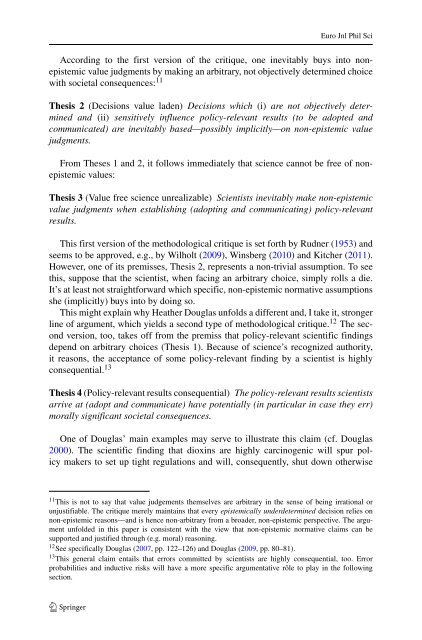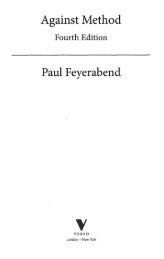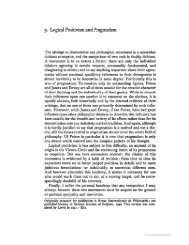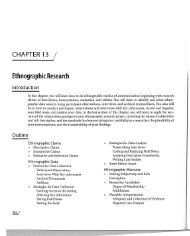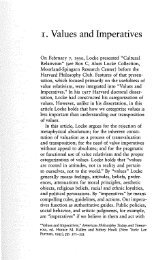EuroJnlPhilSciAccording to <strong>the</strong> first version <strong>of</strong> <strong>the</strong> critique, one inevitably buys into nonepistemic<strong>value</strong> judgments by making an arbitrary, not objectively determined choicewith societal consequences: 11Thesis 2 (Decisions <strong>value</strong> laden) Decisions which (i) are not objectively determinedand (ii) sensitively influence policy-relevant results (to be adopted andcommunicated) are inevitably based—possibly implicitly—on non-epistemic <strong>value</strong>judgments.From Theses 1 and 2, it follows immediately that science cannot be <strong>free</strong> <strong>of</strong> nonepistemic<strong>value</strong>s:Thesis 3 (Value <strong>free</strong> science unrealizable) Scientists inevitably make non-epistemic<strong>value</strong> judgments when establishing (adopting and communicating) policy-relevantresults.This first version <strong>of</strong> <strong>the</strong> methodological critique is set forth by Rudner (1953)andseems to be approved, e.g., by Wilholt (2009), Winsberg (2010) and Kitcher (2011).However, one <strong>of</strong> its premisses, Thesis 2, represents a non-trivial assumption. To seethis, suppose that <strong>the</strong> scientist, when facing an arbitrary choice, simply rolls a die.It’s at least not straightforward which specific, non-epistemic normative assumptionsshe (implicitly) buys into by doing so.This might explain why Hea<strong>the</strong>r Douglas unfolds a different and, I take it, strongerline <strong>of</strong> argument, which yields a second type <strong>of</strong> methodological critique. 12 The secondversion, too, takes <strong>of</strong>f from <strong>the</strong> premiss that policy-relevant scientific findingsdepend on arbitrary choices (Thesis 1). Because <strong>of</strong> science’s recognized authority,it reasons, <strong>the</strong> acceptance <strong>of</strong> some policy-relevant finding by a scientist is highlyconsequential. 13Thesis 4 (Policy-relevant results consequential) The policy-relevant results scientistsarrive at (adopt and communicate) have potentially (in particular in case <strong>the</strong>y err)morally significant societal consequences.One <strong>of</strong> Douglas’ main examples may serve to illustrate this claim (cf. Douglas2000). The scientific finding that dioxins are highly carcinogenic will spur policymakers to set up tight regulations and will, consequently, shut down o<strong>the</strong>rwise11 This is not to say that <strong>value</strong> judgements <strong>the</strong>mselves are arbitrary in <strong>the</strong> sense <strong>of</strong> being irrational orunjustifiable. The critique merely maintains that every epistemically underdetermined decision relies onnon-epistemic reasons—and is hence non-arbitrary from a broader, non-epistemic perspective. The argumentunfolded in this paper is consistent with <strong>the</strong> view that non-epistemic normative claims can besupported and justified through (e.g. moral) reasoning.12 See specifically Douglas (2007, pp. 122–126) and Douglas (2009, pp. 80–81).13 This general claim entails that errors committed by scientists are highly consequential, too. Errorprobabilities and inductive risks will have a more specific argumentative rôle to play in <strong>the</strong> followingsection.
Euro Jnl Phil Scisocially beneficial economic activities. If scientists, however, refute that very hypo<strong>the</strong>sis,dioxins won’t be banned and <strong>the</strong> public will be exposed to a potentially harmfulsubstance. <strong>In</strong> any case, <strong>the</strong> scientists’ decision has far-reaching effects, which will beparticularly harmful provided <strong>the</strong>y err.But whenever we face a choice with morally significant consequences, <strong>the</strong> idea<strong>of</strong> responsibility requires us to adopt a moral point <strong>of</strong> view, i.e. to consider ethicalaspects in <strong>the</strong> decision deliberation:Thesis 5 (Moral responsibility) Any decision that is not objectively determined andhas, potentially, morally significant societal consequences, should be based on nonepistemic<strong>value</strong> judgments (instead <strong>of</strong> being taken arbitrarily).That’s why it would be morally wrong (in <strong>the</strong> light <strong>of</strong> Theses 1, 4 and 5) to follow<strong>the</strong> <strong>value</strong> <strong>free</strong> <strong>ideal</strong> in scientific inquiry:Thesis 6 (Value <strong>free</strong> science unethical) Scientists should rely on non-epistemic <strong>value</strong>judgments when establishing (adopting and communicating) policy-relevant results.The second version <strong>of</strong> <strong>the</strong> methodological critique constitutes a conclusive argument,at least once <strong>the</strong> arbitrariness <strong>the</strong>sis—<strong>the</strong> cornerstone <strong>of</strong> <strong>the</strong> critique—isgranted. This very <strong>the</strong>sis will be fur<strong>the</strong>r discussed in <strong>the</strong> following sections.3 How uncertainty triggers arbitrarinessPolicy making requires definite and unequivocal answers to various factual questions,or so it seems. Take Douglas’ example from health and environmental policy (cf.Douglas 2000): Are dioxins carcinogenic? Is <strong>the</strong>re a threshold below which exposureto dioxins is absolutely safe—and if so, where? How many persons, out <strong>of</strong> a hundred,develop malignant tumors as a result from exposure to dioxins at current rates? Scientistsare expected to answer <strong>the</strong>se questions with “plain” hypo<strong>the</strong>ses: Yes, dioxinsare carcinogenic; or: no, <strong>the</strong>y aren’t. The safety threshold lies at level X; or: it lies atlevel Y. So and so many persons (out <strong>of</strong> a hundred) currently suffer from malignanttumors because <strong>of</strong> exposure to dioxins.Under uncertainty, i.e. when <strong>the</strong> empirical evidence or <strong>the</strong> <strong>the</strong>oretical understanding<strong>of</strong> a system is limited, such plain hypo<strong>the</strong>ses can nei<strong>the</strong>r be confirmed nor berejected beyond reasonable doubt. As <strong>the</strong> inference to <strong>the</strong> policy-relevant result,which <strong>the</strong> scientist is ultimately going to communicate, becomes error prone, <strong>the</strong>error probabilities or, more generally, <strong>the</strong> inductive risks one is ready to accept whendrawing <strong>the</strong> inference have to be specified. Clearly, errors can be committed all along<strong>the</strong> inference chain—including <strong>the</strong> generation and interpretation <strong>of</strong> data, <strong>the</strong> choice <strong>of</strong><strong>the</strong> model, <strong>the</strong> specification <strong>of</strong> parameters and boundary conditions, etc.—, so inductiverisks have to be taken care <strong>of</strong> throughout <strong>the</strong> entire inquiry (and not merely at itsfinal step). This gives <strong>the</strong> scientists considerable leeway, because <strong>the</strong>re is no way inwhich <strong>the</strong> methodological management <strong>of</strong> inductive risks (specifically <strong>the</strong> acceptance<strong>of</strong> certain error probabilities) is objectively, i.e. empirically or logically, determined.


